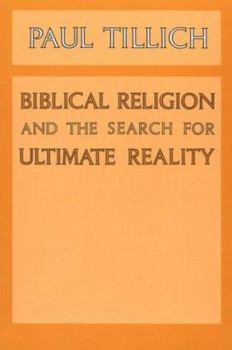Biblical Religion and the Search for Ultimate Reality
Select Format
Select Condition 
Book Overview
Dr. Tillich shows here that in spite of the contrast between philosophical and biblical language, it is neither necessary nor possible to separate them from each other. On the contrary, all the symbols used in biblical religion drive inescapably toward the philosophical quest for being. An important statement of a great theologian's position, this book presents an eloquent plea for the essential function of philosophy in religious thought.
Format:Paperback
Language:English
ISBN:0226803414
ISBN13:9780226803418
Release Date:March 1964
Publisher:University of Chicago Press
Length:96 Pages
Weight:0.26 lbs.
Dimensions:0.3" x 5.2" x 7.9"
Customer Reviews
4 ratings
Ultimate reality cannot be rushed
Published by Thriftbooks.com User , 15 years ago
This tiny tome is the thickest piece of reading I have ever encountered. Tillich is crystal clear and exhaustive in his treatment of very abstruse matters here. I found that, in order to truly comprehend Tillich's message, I had to return again and again to certain passages. With teutonic concision, he parses and defines, then synthesizes and proceeds to the next level of certainty, gradually building very cogent models of philosophic endeavor and mystic revelation, then comparing and contrasting them dispassionately and honestly. If you really want to come to terms with the differences between religion and philosophy, the subjective acceptance of knowledge and principles delivered from another, versus the relatively objective testing of hypotheses and building of thoretic systems, this is the book for you. Do not, however, be deceived by its appearance of brevity. The weighty matters so elegantly covered in this book will take time and serious study to digest. A worthy venture, but not one to be embarked upon lightly. To the reader who perseveres, this book offers much clarity and discernment. To any other, it will seem nonsense.
Tillich and the Bible.
Published by Thriftbooks.com User , 15 years ago
Tillich has produced a book which links the Bible and our faith to our times in a fresh and meaningful way. His writing is clear and concise. An enjoyable read without being too specialized. I enjoyed the exposure to more of the thought of this brilliant philosopher and theologian.
Philosophy and religion together...
Published by Thriftbooks.com User , 21 years ago
This small work of Tillich's is one of his later publications; deriving from a lecture series in the 1950s, it shows in very short order the combination of Tillich's philosophical and psychological ideas coupled with his view on the authority of biblical scripture in a Christian context. Tillich states that if humans enter the levels of personal existence which have been rediscovered by depth psychology, there is a collective unconscious in which we participate. This draws together all of our ancestors. Remember here that Tillich speaks in other contexts of the Ground of Being, so ideas such as this one make a consistent sense. Tillich continues to be criticised for the philosophical language he uses, how radical a departure it seems to a more scripturally-based faith (students in my classes perennially complain of this). However, Tillich takes on the challenge here to look at this contrast in language, arguing that in fact it is impossible to separate out the language and meaning of philosophy from the imagery contained in the biblical texts. Tillich's overarching idea through his entire body of work is to reconstitute the importance of theology and faith into a culture, academic and secular, who have been drawn away by seemingly more objective, rational enterprises such as science. The Enlightenment project of rationalism over all led to the questioning of orthodoxy -- Tillich maintains the questioning, but draws back in the ideas of God and biblical witness to religion in the terms of the modern academy. Nowhere is that project more clear than in this text.Tillich means for the connection between biblical religion and philosophy to connect at a personal level. He states that from pimitive religion to the present time, religions have had a personalistic level at the deepest heart of the experience. 'Whenever the holy is experienced, the person-to-person character of this experience is obvious.' However, this changes when considering the Ground of Being, and Being Itself. As Tillich states, when we talk, it is to somebody, but we participate in something. This distinction becomes key to Tillich's overall analysis.In the last chapters, Tillich examines different ideas of ontology versus the subjective and objective sides of biblical religion. Tillich's final paragraph encapsulates a classic sense of Tillichian analysis -- faith comprises both itself and its negation. Tillich clearly states that there is no particular philosophical framework necessary for salvation -- neither Plato nor Aristotle, neither Kant nor Hegel, and so forth -- but that there is an ontological question implied. The God of the philosophers is the same as the God of the bible (Tillich proclaims, contradicting Pascal). Many Christians are still unconvinced of the value or necessity of philosophy in religious thinking; indeed, many are positively suspicious. Tillich's work helps to explain the value of connecting the two, even if one does not draw the same co
It is a very beauty work.
Published by Thriftbooks.com User , 25 years ago
This book is great. when we read the book, we find the new possibility.But It is not perfect.He said, Christianity is not seperated from contemporary phiiosophy.Therefore We who believe in God can expoud to the phiiosopher who deny God severely. I respect him to try speaking the the phiiosopher .You,too may assent.





